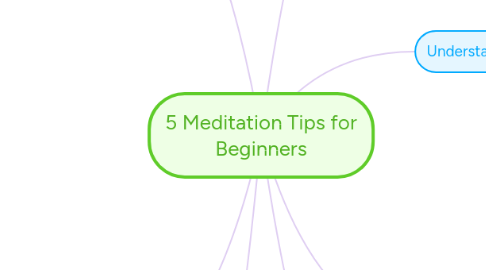
1. Do It Your Way
1.1. Since walking helps people concentrate and reduces distractibility, a meditation that involves walking can be a great place to start.
1.2. Dr Kelly McGonigal suggests a 10 minute walking meditation involving 1 minute of paying attention to each of:
1.2.1. (1) the feeling of your body walking
1.2.2. (2) the feeling of your breath
1.2.3. (3) the sensations of air or wind on your skin
1.2.4. (4) what you can hear
1.2.5. and (5) what you can see.
1.2.6. Follow this with 5 minutes of open awareness where you allow anything you can observe/sense to rise up into your awareness
1.2.6.1. Don't go looking for things to hear, see, feel etc
1.2.6.2. Just let whatever rises up into your awareness to do that and be naturally replaced by something else whenever that happens.
1.3. During the open awareness portion, if your attention drifts to past, future or evaluative thoughts, briefly go back to one of the points of focus to stabilize your attention.
1.4. You can adapt these instructions however you want
1.4.1. Make your practice your own
1.4.2. You're in charge!
1.4.3. For example, do a walking meditation in which you focus on one of the above points of focus for 3 minutes and then do 3 minutes of open awareness.
2. Reduce All-or-Nothing Thinking
2.1. Realistically, there are only a small amount of people who will be willing to meditate on a regular basis.
2.2. Another approach is to do formal daily practice of meditation (such as the walking meditation) for an initial period
2.2.1. and then start just incorporating meditation into your day in informal ways.
2.2.2. For example, incorporating informal meditation into your day might involve paying attention to the sensations of a few breaths each time you switch tasks.
2.3. Doing a sustained period of formal daily practice when you begin meditation will
2.3.1. (1) allow you to try different types of meditation
2.3.2. (2) give you enough comfort and familiarity with meditation that you can restart formal practice if you're going through a particular period of stress or overthinking
2.3.3. (3) develop enough understanding of meditation to come up with your own ideas for informal meditation practices.
2.4. Beginner meditators who practiced for 11 days were over 90% likely to continue to a 12th day.
2.4.1. Sticking with meditation practice at least this long is important.
2.4.2. Doing a 21 or 30 day meditation project is a great way to get started.
3. For more great mind maps, head to www.Biggerplate.com
4. Introduction
4.1. Meditation is good for you
4.2. Can help you feel calmer, amongst other benefits
4.3. However, many people's descriptions of meditation aren't appealing
4.3.1. it sounds like just another thing you don't have time for
4.4. This map outlines 5 tips for beginners that overcome the problems of:
4.4.1. lack of appeal
4.4.2. it seeming too daunting
5. Understand Benefits
5.1. Understand what meditation can do for you if you have issues with:
5.1.1. stress
5.1.2. anxiety
5.1.3. irratability
5.1.4. overthinking
5.2. Great way to increase resilience to stress
5.3. If you have anxiety, it will help reduce tendency towards physiological over arousal and calm nervous system
5.4. Particularly useful for those prone to overthinking
5.4.1. Makes sense, given that meditation is about focusing attention on something "experiential"
5.4.1.1. e.g. sensations of beathing
5.4.2. Brings your attention back to focus when it drifts
5.5. Helps you recognise if you're having irritable thoughts, before they are expressed
6. Start Small
6.1. 3-5 minutes or less
6.2. Most beginner meditators start with this amount of time
6.3. 3 minutes can even feel too long, so you could start smaller
6.3.1. e.g. paying attention to the sensations of taking 3 breaths
7. Understand Principles
7.1. Beginners often think the goal is to get to the point that they can focus without becoming distracted
7.2. More useful goal is becoming aware of when your mind has drifted sooner
7.3. Becoming aware of what you're thinking is the basis of successful Cognitive Therapy
7.3.1. You can't restructure thoughts if you haven't first developed the ability to identify them
